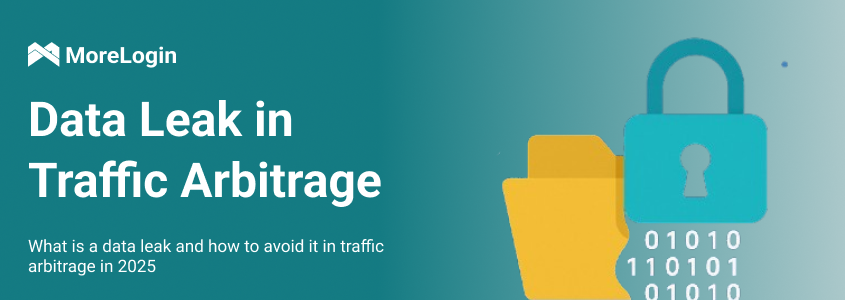
- Product

- Pricing
- Affiliate Program
- Use Cases
- Resource


In today’s world, where data is often called “the new oil,” ensuring its security has become a top priority. From personal photos to banking details and complex business infrastructures—everything is at risk.
This issue is especially critical in high-risk fields such as traffic arbitrage, where the compromise of a single tool can disrupt the entire operational process.
In this article, we’ll explain what a data leak is, how to prevent it, review real cases from the arbitrage world (including the Dolphin {anty} incident), and explore how modern tools like MoreLogin approach data security.
A data leak (or data breach) is a security incident where confidential, protected, or private information is copied, transmitted, viewed, stolen, or used by an unauthorized party.
Simply put, it’s when your data ends up in the wrong hands.
Personally Identifiable Information (PII): Names, addresses, phone numbers, passport details.
Financial Data: Credit card numbers, bank account details, cryptocurrency wallet information.
Login Credentials: Usernames, passwords, security questions, 2FA keys.
Corporate Data: Intellectual property, customer databases, internal correspondence.
Browser Profile Data: Cookies, browsing history, saved passwords, extension data (critical in traffic arbitrage).
Malicious Attacks (Hacking): Exploiting software vulnerabilities, SQL injections, DDoS attacks.
Social Engineering (Phishing): Tricking users into willingly handing over credentials.
Malware: Trojans, password stealers, ransomware.
Human Error: Sending data to the wrong recipient, weak passwords, lost devices.
Service Provider Vulnerabilities: Cloud or SaaS providers being hacked—particularly dangerous for users who store data remotely.
In traffic arbitrage, data security is absolutely critical. Arbitrage specialists operate hundreds of accounts, payment methods, and specialized tools—making them attractive targets for cybercriminals.
The primary tool for an arbitrager is the anti-detect browser, which stores digital fingerprints, cookies, logins, passwords, and often extension data (e.g., MetaMask crypto wallets).
A breach of an anti-detect browser is not just the loss of one account—it’s the compromise of the entire business infrastructure.
How it happens: Attackers gain access to browser cookies (via a stealer on the victim’s computer or a breach of the anti-detect browser’s cloud storage).
Impact: Hackers log into Facebook*, Google Ads, or TikTok ad accounts without needing login credentials. Result—hijacked accounts, stolen ad budgets, and asset blocks.
How it happens: Stolen unencrypted extension data from wallets like MetaMask.
Impact: Immediate and direct financial loss.
How it happens: Users store passwords, 2FA backup codes, and seed phrases in profile notes.
Impact: Full loss of access to all services—email, payment systems, exchanges.
Key takeaway: Unlike regular users, traffic arbitragers risk losing their entire business—including account farms, budgets, and reputation—if a data leak occurs.
While it’s impossible to eliminate all risk, it can be significantly reduced through proper security practices.
Use strong, unique passwords for every service (password managers recommended).
Always enable two-factor authentication (2FA) via authenticator apps (not SMS).
Be cautious with phishing attempts—never log in via suspicious links.
Keep all software up to date to patch vulnerabilities.
Never store critical data (2FA keys, wallet seeds) in plain text.
Choosing the right anti-detect browser is not just about features—it’s about security architecture.
This is where advanced solutions like MoreLogin stand out.
Following high-profile breaches among competitors, MoreLogin has built its system around end-to-end protection—from browser extensions to cookie storage and synchronization.
Only verified extensions from the Chrome Web Store are allowed.
Attempts to install fake or compromised extensions are blocked.
Local storage by default—no forced cloud sync.
End-to-end encryption (E2EE) for team sync—keys are generated locally and never shared with the server.
Local extension data encryption prevents stolen files from being used in other browsers.
All cookies and saved passwords are encrypted.
Even if a stealer or physical theft occurs, the data remains unusable without decryption keys.
Prioritize local storage over cloud storage whenever possible.
If sync is required, use E2EE where you control the decryption key.
Segment your data—don’t keep all accounts or funds in one service.
Never store 2FA or seed phrases in browser profile notes.
Regularly audit extensions and install only from official sources.
Rotate master account passwords and monitor security news for your tools.
Apply a Zero Trust approach—verify every device and connection.
Stay educated on phishing and social engineering tactics.
Keep encrypted backups of important data.
A data leak is an ongoing threat in the digital world.
In fast-moving industries like traffic arbitrage, the consequences can be catastrophic.
Cases like the Dolphin {anty} breach highlight the dangers of centralized data storage, while solutions like MoreLogin show how advanced encryption and local-first design can protect professional users.
Your safety depends on combining secure tools with strict digital hygiene. Always prioritize the security architecture of the software you trust with your business-critical data.
*Facebook is owned by Meta, designated as an extremist organization and banned in Russia.